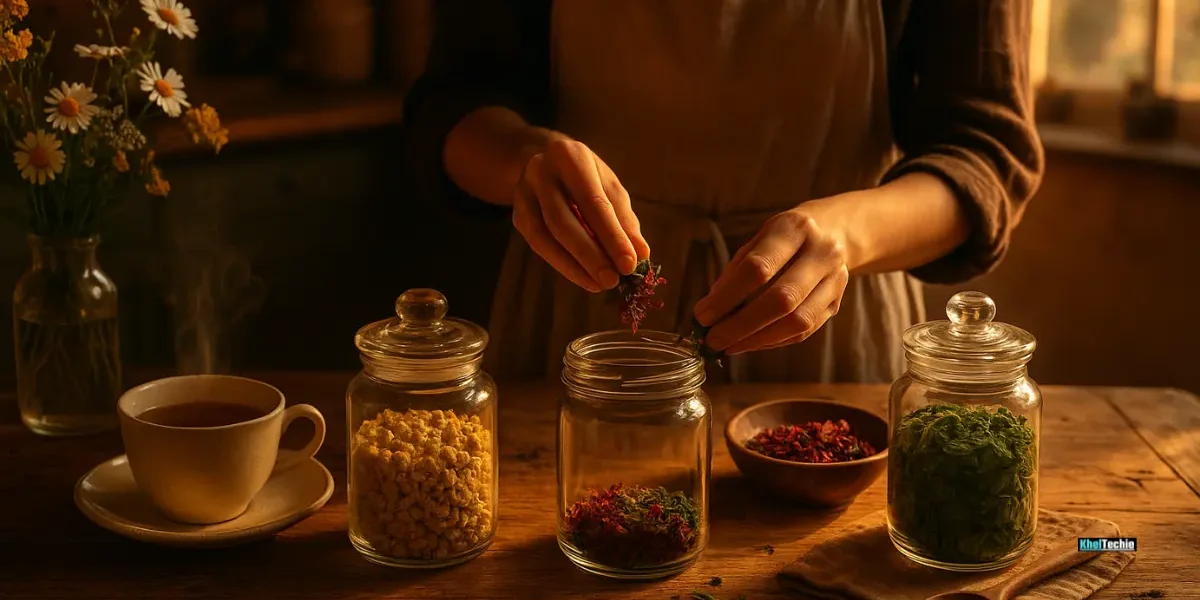DIY Herbal Teas for Wellness : Brew Natural Health at Home
Why DIY Herbal Teas Are the Wellness Boost You Need!
Feeling overwhelmed by stress, digestion issues, or restless nights? Instead of reaching for another supplement or over-the-counter remedy, consider crafting your own herbal teas. These natural infusions can offer a soothing, effective, and personalized approach to wellness.
Herbal teas have been cherished for centuries across cultures for their health benefits. From calming chamomile to invigorating ginger, the right blend can support your body and mind. Creating your own herbal teas allows you to tailor ingredients to your specific needs, ensuring both efficacy and enjoyment.
Lets explore the herbal tea for wellness
Also read – A 24-Hour Dopamine Reset Challenge
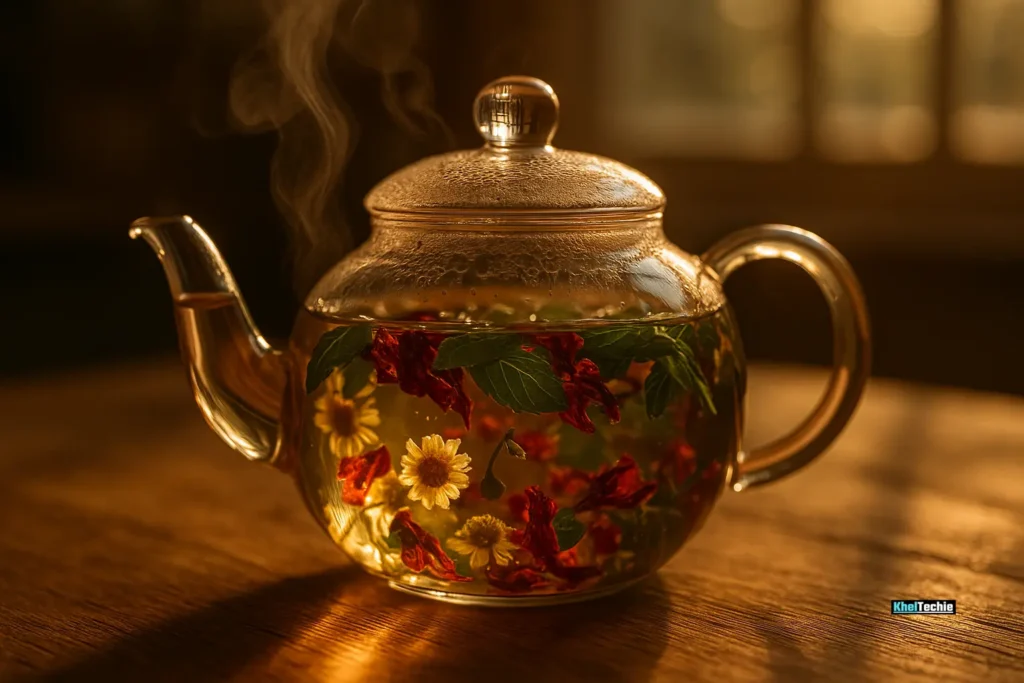
What Is Herbal Tea?
Herbal tea, or tisane, is a beverage made by steeping herbs, flowers, spices, or other plant materials in hot water. Unlike traditional teas derived from the Camellia sinensis plant (like black or green tea), herbal teas are typically caffeine-free and offer a wide range of flavors and health benefits.
Common ingredients include:
Lemon Balm: Eases anxiety and promotes sleep.
Chamomile: Known for its calming effects.
Peppermint: Aids digestion and relieves headaches.
Ginger: Reduces inflammation and nausea.
Hibiscus: Supports heart health.
Herbal teas have been used for centuries across cultures, from Traditional Chinese Medicine to Ayurveda and Native American healing practices. Today, they’re more popular than ever, especially among people seeking natural alternatives to pharmaceuticals.

Why Making Your Own Herbal Teas Matters
Let’s face it, tea isn’t just a drink anymore. It’s a wellness ritual and when you make it yourself, it becomes even more powerful. According to True Leaf Market, home-dried herbs keep more of their natural oils and antioxidants, especially when harvested before flowering and dried gently. That means your cup will have stronger flavors, richer scents, and more wellness benefits than a store-bought bag.
But here’s where it gets deeper, According to Epicurious, the ritual of brewing your own herbal tea can actually reduce stress. Taking time to steep your leaves, inhale the aroma, and sip slowly works like a mini mindfulness session. You disconnect from the chaos and reconnect with your senses.
When you blend your own herbs, you’re not just saving money or avoiding preservatives, you’re curating your own wellness, one cup at a time. Whether it’s calming chamomile at night or energizing mint in the morning, the control is yours. You’re crafting tea that supports your body, your mood, and your lifestyle.
So next time you reach for a mug, consider skipping the pre-packed stuff. Brew with intention, sip with purpose, and let each cup be your small act of healing.
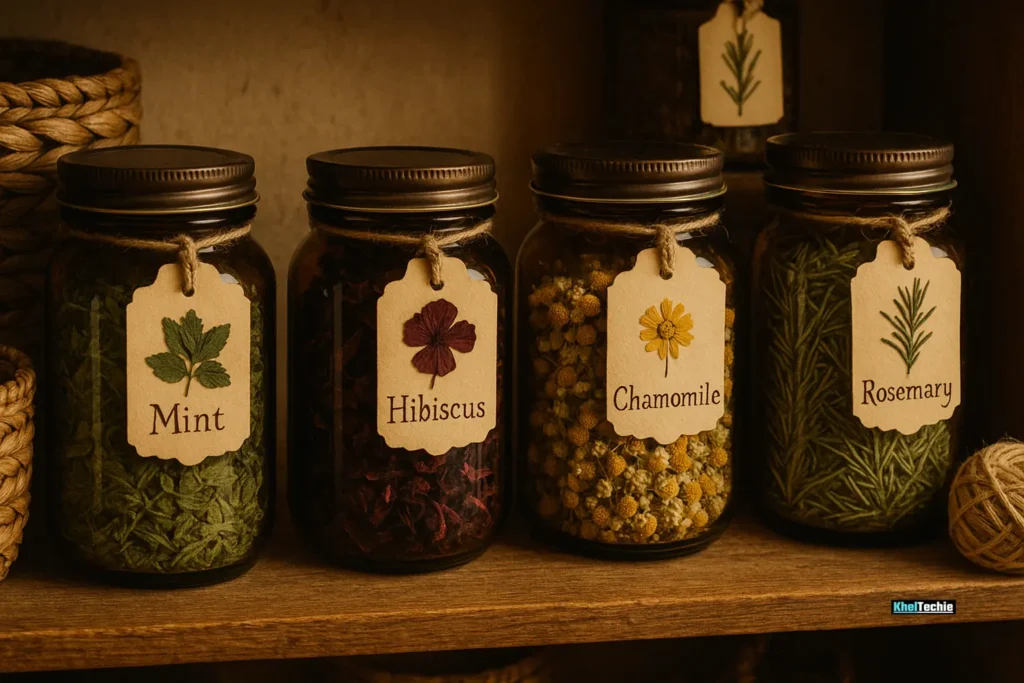
Step-by-Step Guide to Making Herbal Tea at Home
Ready to start brewing your own wellness potions? Here’s how to do it safely, effectively, and deliciously.
Step 1: Choose Your Herbs Wisely
Start by selecting high-quality herbs. You can use:
- Fresh herbs: Mint, lemon balm, basil
- Dried herbs: Chamomile, lavender, hibiscus
- Roots and spices: Ginger, turmeric, licorice root
Always source organic herbs if possible. Non-organic herbs may contain pesticides or heavy metals.
| Herb | Benefits | Best Used For |
|---|---|---|
| Chamomile | Calming, anti-inflammatory | Sleep, relaxation |
| Peppermint | Digestive aid, refreshing | Bloating, headaches |
| Ginger | Anti-nausea, warming | Cold days, digestion |
| Hibiscus | Rich in antioxidants | Heart health, immune support |
| Lemon Balm | Reduces stress, uplifting | Anxiety, mood swings |
Step 2: Gather Your Supplies
You don’t need fancy equipment to make herbal tea. Here’s what you’ll need:
- Fresh or dried herbs
- Teapot or heatproof jug
- Strainer or tea infuser
- Measuring spoon
- Mason jar or sealed container for storage (if making sun tea or concentrates)
Step 3: Decide on Your Brewing Method
There are several ways to extract the goodness from herbs:
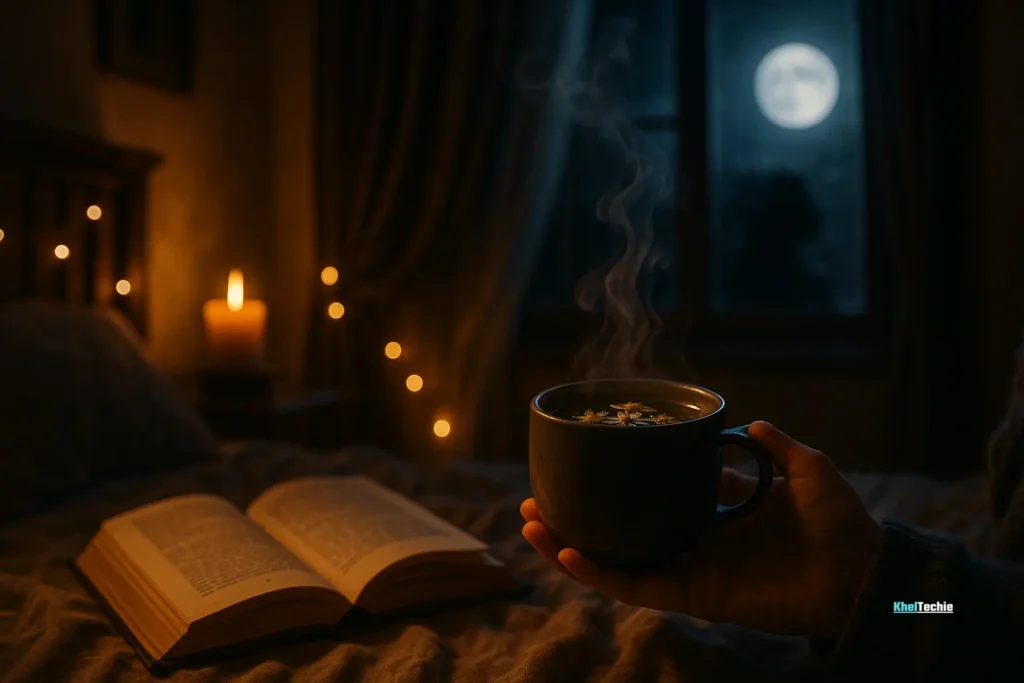
Hot Water Infusion (Best for Leaves & Flowers)
- Boil water.
- Add 1–2 tablespoons of dried herbs (or 2–3 tablespoons fresh) per cup of water.
- Let steep for 5–15 minutes.
- Strain and enjoy.
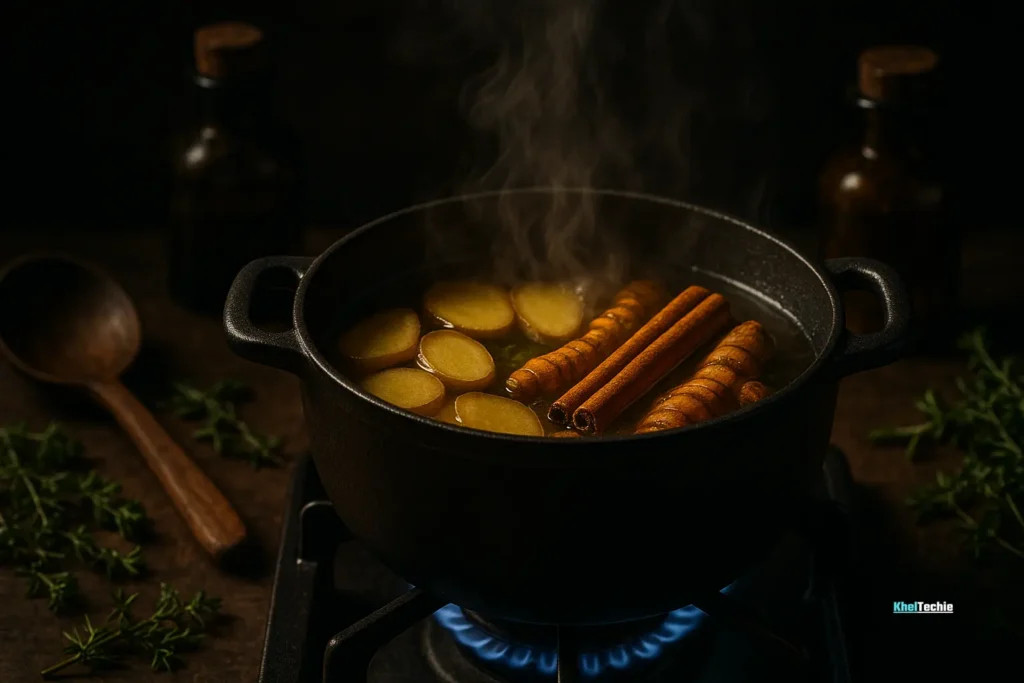
Decoction (Best for Roots & Bark)
- Chop or crush tough roots/spices (e.g., ginger, cinnamon).
- Add to cold water.
- Bring to a boil, then simmer for 10–20 minutes.
- Strain and drink warm.
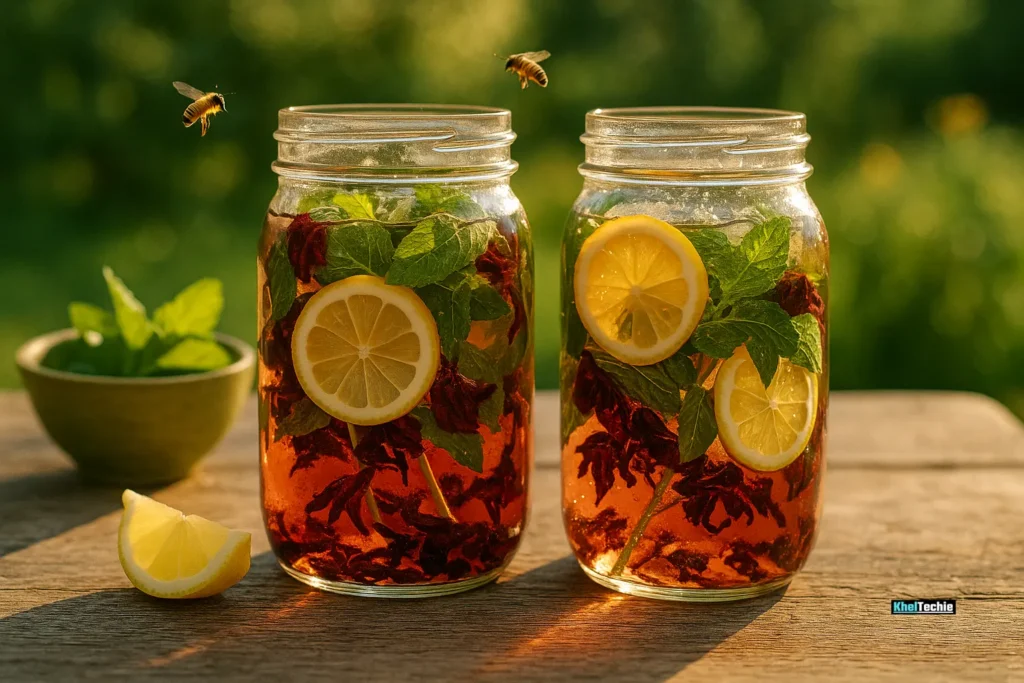
Sun Tea (Great for Iced Herbal Tea)
- Place herbs in a glass jar.
- Fill with water and stir.
- Cover and leave in direct sunlight for 3–5 hours.
- Strain and refrigerate.
Step 4: Experiment with Flavor
Want to elevate your tea experience? Try these natural enhancers:
- Sweeteners: Raw honey, maple syrup, stevia
- Citrus: Lemon, lime, orange zest
- Spices: Cinnamon stick, cardamom pods
- Essential oils: A drop of peppermint or orange oil (food-grade only!)
Consideration Blend:
- 1 tsp dried chamomile
- ½ tsp dried lavender
- 1 slice fresh lemon
- 1 tsp raw honey
Steep in hot water for 10 minutes and enjoy a calming bedtime tea.
Step 5: Store and Reuse Properly
- Leftover tea: Store in a sealed container in the fridge for up to 2 days.
- Unused herbs: Keep in a cool, dark place in airtight containers.
- Reuse herbs: Yes! You can re-steep most herbs once more, though the second infusion will be milder.
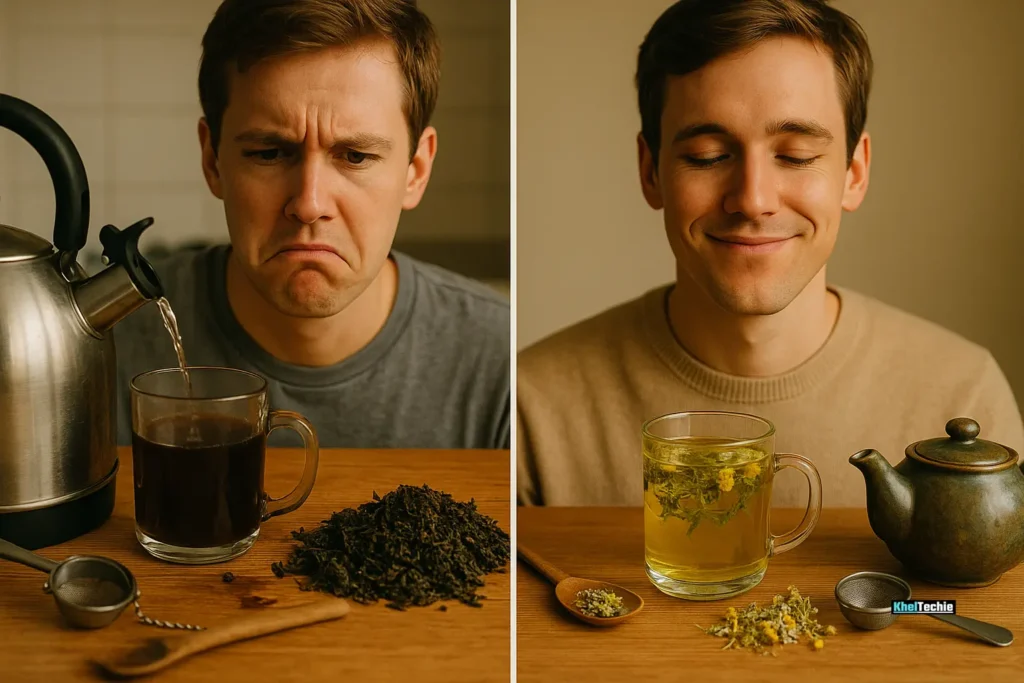
Common Mistakes to Avoid When Brewing Herbal Tea
Even experienced herbalists make mistakes. Here are some common ones to avoid:
❌ Using too much herb – More isn’t always better. Overloading your tea can cause bitterness or unwanted side effects.
❌ Boiling delicate herbs – Some herbs like chamomile and mint lose their flavor and medicinal properties when boiled.
❌ Ignoring safety guidelines – Some herbs interact with medications. Always consult a healthcare provider before using herbs medicinally.
❌ Skipping research – Not all herbs are safe for everyone. For example, licorice root shouldn’t be consumed daily for long periods.
❌ Using tap water with high chlorine content – Chlorine can strip away subtle flavors. Use filtered or spring water instead.
Also read – Top 10 Micro-Habits for Daily Wellness Success

Conclusion: Start Sipping Your Way to Better Health
Making your own herbal teas is more than just a hobby, it’s a step toward taking charge of your wellness naturally. From calming nerves to boosting immunity, herbal teas offer something for every need and taste. Whether you’re new to herbalism or looking to deepen your practice, this guide gives you everything you need to get started today.
Now it’s your turn!
Leave a comment below sharing your favorite herbal tea blend or ask any question you still have. We’d love to hear from you! And if you found this article helpful, don’t forget to share it with someone who loves tea and self-care.
Note: Always consult with a healthcare professional before making significant changes to your diet or starting new supplements.
FAQs
Can I Drink Herbal Tea Every Day?
Yes, but moderation is key. Most herbal teas are safe for daily use, but some (like licorice root or senna) should be limited due to potential side effects.
Are there any herbs I should avoid?
Some herbs can interact with medications or aren’t recommended during pregnancy. Always consult with a healthcare provider.
How Long Should I Steep Herbal Tea?
Most herbal teas need 5–15 minutes of steeping. Delicate herbs like mint or lemon balm should steep for less time; tougher roots like ginger benefit from longer steeping.
Do Herbal Teas Help With Weight Loss?
Some herbal teas, like green tea blends or dandelion root tea, may support metabolism and detoxification, but no tea alone causes weight loss. They work best as part of a healthy lifestyle.
Can Kids Drink Herbal Tea?
Yes, many herbal teas are kid-friendly. Chamomile, mint, and rooibos are great options. Always check dosage and consult a pediatrician for young children.
How Do I Know If My Herbs Are Still Good?
Look for faded color, weak aroma, or musty smell, these are signs of old or poor-quality herbs. Dried herbs typically last 1–2 years when stored properly.
Can I Mix Herbal Teas With Green or Black Tea?
Absolutely! Many people blend black or green tea with herbs for extra flavor and benefits. For example, adding mint to green tea boosts digestion and refreshes breath.
Are There Any Side Effects of Herbal Tea?
While most herbal teas are safe, some may cause allergic reactions, interact with medications, or cause digestive upset. Always research the herb or consult a professional.
Can I Make Herbal Tea with Essential Oils?
Only if they’re labeled as food-safe. Never add regular essential oils directly to tea, they’re highly concentrated and not meant for ingestion unless specified.
What’s the Best Time to Drink Herbal Tea?
It depends on the herb:
Morning: Peppermint, lemon balm
Afternoon: Hibiscus, rooibos
Evening: Chamomile, valerian root
How long do homemade herbal teas last?
Properly stored dried herbs can last up to nearly a month, but potency may decrease over time.

